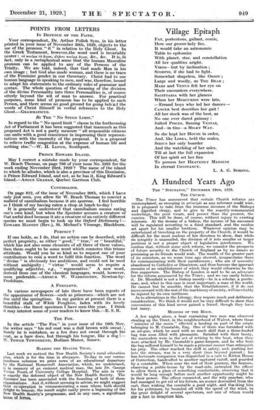POINTS FROM LETTERS Ix DEFENCE OF THE FAITH.
Your •correspondent, Dr. Arthur Pollok Sym, in his .letter printed in, your issue of. November 30th, 1929, objects to the rise of the pronoun ." it " in relation to the Holy Ghost. In the Greek Testament, however,the word used is invariably neuter : ciaPert arpeflut ii-por, &C., &C. It is, in inct, only in a metaphorical sense that the human Masculine pronoun can , be applied to any of the Persons of the Trinity. We are told, indeed, that God made Man in his own image ; but God also made woman, and there is no trace of the Feminine gender in our theocracy. Christ had to use Mini= language in speaking to men, and was, therefore, bound to adapt his statements to the ordinary rules of grammar and syntax. The whole question of the meaning of the division of the divine Personality into three Personalities is, of course utterly beyond the wit of man to answer. • For practical purposes, some kind of pronoun has to be applied to each Person, and there seems no good ground for going beh:n.1 the words of Christ Himself in verbal references to the Holy Ghost.—GRAmmAricus.
Re THE " No SPEED LIMIT."
In regard to the " No speed limit " clause in the forthcoming Act of Parliament it has been suggested that inasmuch as this proposed Act is not a party measure all responsible citizens can unite with a good conscience in impressing their represen- tatives with the enormity of the proposal. It is a proposal to relieve traffic congestion at the expense of human life and nothing else."—W. H. LLOYD, Southport.
PRINCE EDWARD ISLAND.
May I correct a mistake made by your correspondent, Sir W. Beach Thomas, on page 766 of your issue No. 5291 for the week ending November 23rd, 1929 ? The name of the island to which he alludes, which is also a province of this Dominion, is Prince Edward Island, and not, as he has it, King Edward's Island.—ANGUS GRAHAM, Quebec Garrison Club.
CANNIBALISM.
On page 812, of the issue of November 30th, which I have only just seen, you allow Sir W. Beach Thomas to convict a mallard of cannibalism because it ate sparrow. I feel horrible as I think of my having eaten a chop at lunch to-day !
It is generally understocd that cannibalism means eating one's own kind, but when the Spectator accuses a creature of thatawful deed because it ate a creature of an entirely different species we must begin to look up the Oxford Dictionary !- EDWARD HANSON (Rev.), St. Michael's Vicarage, Blackburn.
PERFECT ?
If one holds, as I do, that no action can be described, with perfeet propriety, as either " good," " true," or " beautiful," which has not also some elements of all three of these values, then there ought to be some word which connotes this triune attribute. Would you be so kind as to request one of your contributors to coin a word to fulfil this function. The word "'divine " is obviously too ambitious, and could not be used without ambiguity ; " virtue " would seem to require a qualifying adjective, e.g., " regenerative." A new word, derived from one of the classical languages, would, however, seem preferable.—ARTHUR W. WARRINGTON, Newton-by- Frodshaxn.
A FOXGLOVE.
In various newspapers of late there have been reports of the appearance of flowers—such as primroses—which are not due until the springtime. In my garden at present there is a beautiful stalk of White Foxglove, laden with its lovely thimbles—the finest specimen I have seen this year. I think it may interest some of your readers to know this.—E. S. R..
THE Fox.
In the article "The Fox" in your issue of the 16th Nov. the writer says " his red coat was a dull brown with sweat.', Surely he is mistaken, as a fcix does not sweat through his coat, as a hare does, but through his tongue, like a dog !- W. TOWER TOwxsHEND, Bodiam. Manor, Sussex.
•
BLAZING THE HEALTH TRIAL.
.Last. . week we noticed the New Health Society's rural education plan, which is for the time in abeyance. To-day in our corres- pondence columns we print news of an educational departure by the National Homecieft Association, which, we understand, is in -memory of an eminent medical man, the late Dr. George yivian Poore, of University College Hospital. The aim in view Is exactly the deferred object of the New Health Society. The Spectator has been associated with the founding of both of these orpnizations. And if, without _seeming to advise, we might suggest, their eo--ciiieration -commemorating. a man whom both should delight to honour, the result- might easily'prove a beginning of the' New Health Society's programme, and in any case, a significant, Union of forces.


































 Previous page
Previous page